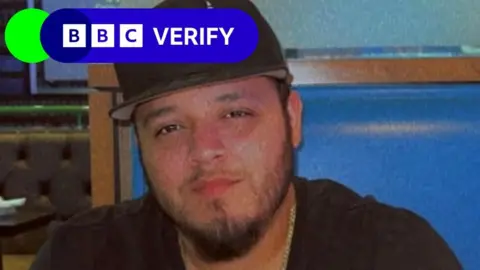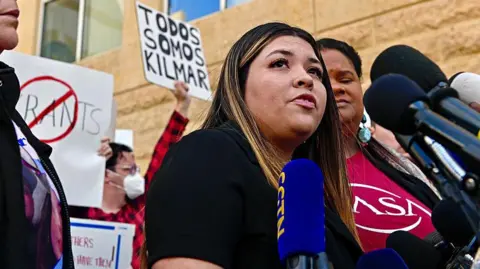BBC Verify
 Reuters
ReutersThe case of Kilmar Abrego Garcia – a 29-year-old from El Salvador who was deported from the US in March – has prompted a legal showdown over the administration’s immigration policy.
Judges all the way up to the US Supreme Court have ruled that Mr Abrego Garcia was deported in error and that the US government should help “facilitate” his return to his home in Maryland.
But the White House has accused Mr Abrego Garcia of being a member of the transnational Salvadorian gang MS-13, a designated foreign terrorist organisation, saying that he will “will never live” in the US again.
Mr Abrego Garcia denies he is a member of the gang and he has not been convicted of any crime.
BBC Verify has examined court documents and public records to determine what’s known – and what is still unknown – about Mr Abrego Garcia and his alleged ties to MS-13.
What do we know about alleged MS-13 links?
Mr Abrego Garcia has acknowledged entering the US illegally in 2012, according to court documents.
In March 2019 he was detained along with three other people in Hyattsville, Maryland, in the car park of a Home Depot.
Officers at the Prince George’s County Police Department said the men were “loitering” and subsequently identified Mr Abrego Garcia and two of the others as members of MS-13.
In a document titled the “Gang Field Interview Sheet”, the local police detailed their observations.
They said Mr Abrego Garcia was wearing a “Chicago Bulls hat and a hoodie with rolls of money covering the eyes, ears and mouth of the presidents on the separate denominations”.
Officers claimed the clothing was “indicative of the Hispanic gang culture” and that “wearing the Chicago Bulls hat represents thay (sic) they are a member in good standing with the MS-13”.
Steven Dudley, a journalist and author who has spent years studying the MS-13 gang, said that it is true that “at some point, the Chicago Bulls logo with the horns became a stand-in of sorts for the MS-13’s devil horns symbol”.
But wearing the logo of the hugely popular basketball team, he added, is of course not exclusive to the gang.
“Any assertions about gang affiliation would need to be corroborated with testimony, criminal history, and other corroborating evidence,” Mr Dudley said.
According to the field interview sheet and other court documents, officers said they were also advised by a “proven and reliable source” that Mr Abrego Garcia was an active member of MS-13’s “westerns clique”, with the rank of “chequeo”.
However, Mr Dudley says that a “chequeo” is not a rank but is instead used to refer to recruits who are yet to be initiated.
 Getty Images
Getty ImagesLawyers for Mr Abrego Garcia’s argued in court filings that the “westerns clique” is based in New York, where they say their client has never lived. And according to government documents, he has dismissed the information given to police against him as “hearsay”.
According to his lawyers, Mr Abrego Garcia has never been convicted of any criminal offence, including gang membership, in the US or in El Salvador. He lived in the US for 14 years, had three children and worked in construction, according to court records.
But the judge who presided over his 2019 case said that based on the confidential information, there was sufficient evidence to support Mr Abrego Garcia’s gang membership. That finding was later upheld by another judge.
As a result Mr Abrego Garcia was refused bail and remained in custody. During this time he applied for asylum to prevent his deportation to El Salvador.
In October 2019 he was granted a “withholding of removal” order, court documents show – a status different from asylum, but one which prevented the US government from sending him back to El Salvador because he could face harm.
Mr Abrego Garcia’s lawyers say that he was granted the status based on his “well-founded” fear of persecution by Barrio-18, the main rival gang of MS-13.
He said that prior to him entering the US, his family and their business had been threatened and extorted by Barrio-18.
Since 2019, when he was released with the protective order, Mr Abrego Garcia’s lawyers say he has had yearly check-ins with immigration officials, which he has attended “without fail and without incident”.
What are the separate allegations against him?
Mr Abrego Garcia has faced at least two other allegations of criminal activity, neither of which resulted in a conviction.
In 2021, his wife, Jennifer Vasquez Sura, filed a protective order petition against him, alleging that he had physically attacked her on multiple occasions, according to documents shared by the US Department of Homeland Security.
Ms Vasquez Sura said in a statement on 16 April that she had decided not to follow through with the court process at the time and that she and her husband “were able to work through this situation privately as a family, including by going to counseling”.
She described her husband as “a loving partner and father” and has repeatedly denied he is an MS-13 gang member.
On 15 April, White House press secretary Karoline Leavitt also accused Mr Abrego Garcia of involvement in human trafficking.
She appeared to be referencing a report in The Tennessee Star, a conservative news website, which claimed Mr Abrego Garcia was detained by a Tennessee highway patrol officer on suspicion of human trafficking in December 2022.
A report by the Department of Homeland Security said he was stopped for speeding and not staying in his lane.
There were eight other people in the car without luggage, the report said, which led the officer to suspect it could be a case of human trafficking.
However, there was no criminal case was lodged against Mr Abrego Garcia.
“Kilmar worked in construction and sometimes transported groups of workers between job sites, so it’s entirely plausible he would have been pulled over while driving with others in the vehicle,” Mr Abrego Garcia’s wife Jennifer Vasquez Sura said about the incident.






